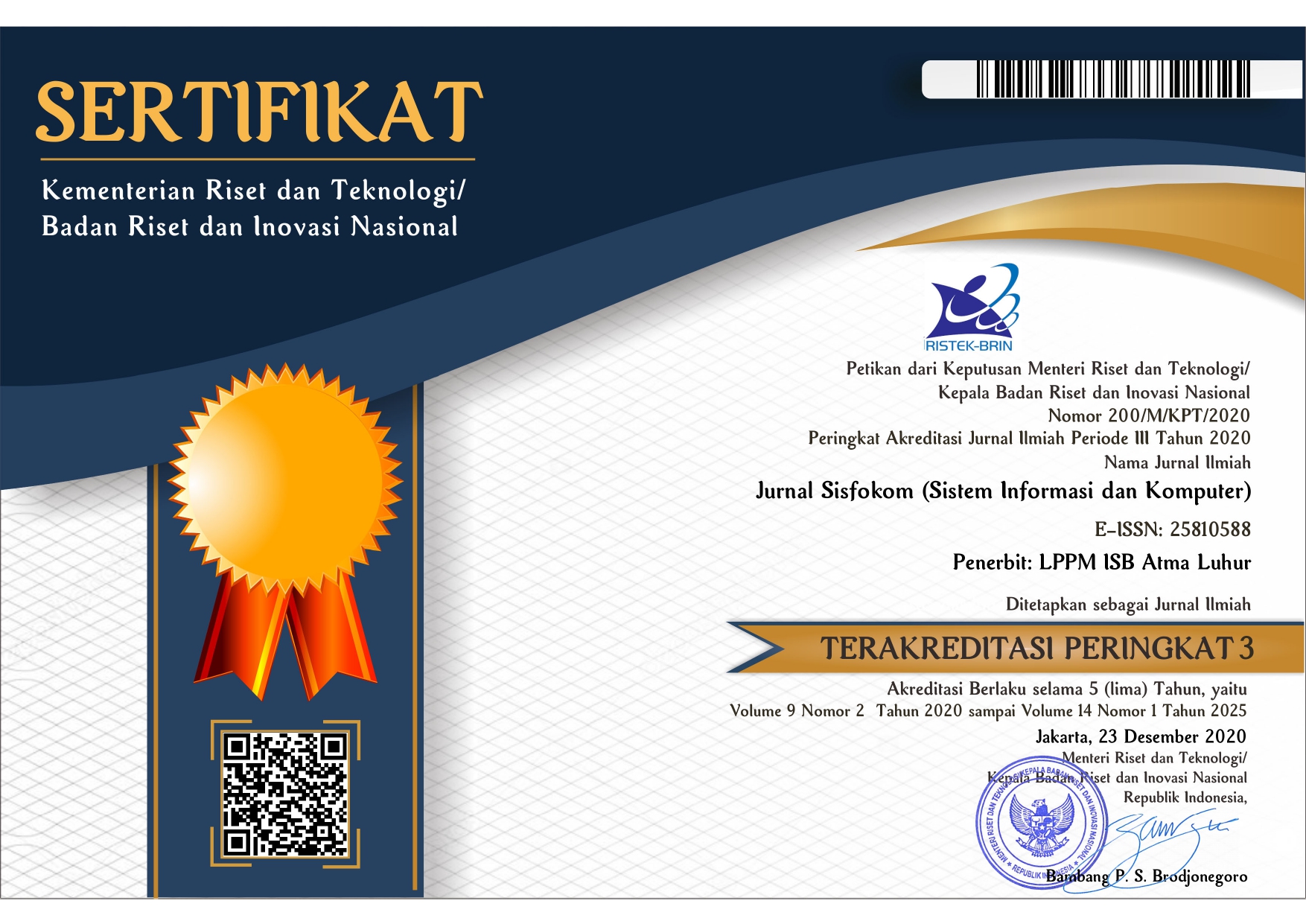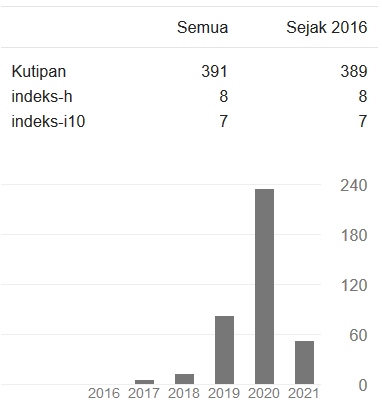Pengaruh E-Service Quality dan E-Trust Terhadap E-Customer Loyalty Pada Pengguna Dompet Digital DANA Melalui E-Satisfaction Sebagai Variabel Intervening
DOI:
https://doi.org/10.32736/sisfokom.v12i1.1593Keywords:
E-Service Quality, E-Trust, E-Customer Loyalty, E-SatisfactionAbstract
Penelitian ini bertujuan untuk menganalisis dan membuktikan pengaruh e-service quality dan e-trust terhadap e-customer loyalty melalui e-satisfaction sebagai variabel intervening pada pengguna dompet digital DANA. Penelitian ini berfokus pada DANA sebagai e-wallet yang paling banyak digunakan oleh masyarakat namun masih banyaknya keluhan yang dirasakan oleh pengguna dompet digital DANA terkait top up yang tidak berhasil, terjadinya error sistem, kesulitan upgrade akun premium, saldo terpotong serta penanganan dari customer service yang lambat dan tidak memberikan solusi. Hal ini terlihat dari hasil review pengguna di Play Store. Jenis penelitian ini adalah explanatory research dengan pendekatan kuantitatif. Pengambilan sampel menggunakan metode nonprobability sampling dengan bentuk purposive sampling. Penelitian ini menggunakan kuesioner online yang dibagikan kepada 100 responden, dengan kriteria pengguna dompet digital DANA yang pernah melakukan transaksi non tunai minimal dua kali atau lebih dalam enam bulan terakhir. Teknik analisis yang digunakan yaitu Structural Equation Modelling berbasis Partial Least Square (PLS) dengan bantuan software SmartPLS 4.0. Hasil pengujian hipotesis menunjukkan bahwa e-service quality berpengaruh positif dan tidak signifikan terhadap e-customer loyalty, e-service quality berpengaruh positif dan signifikan terhadap e-satisfaction, e-satisfaction berpengaruh positif dan signifikan terhadap e-customer loyalty, e-trust berpengaruh positif dan tidak signifikan terhadap e-customer loyalty, e-trust berpengaruh positif dan signifikan terhadap e-satisfaction, e-service quality berpengaruh positif dan signifikan terhadap e-customer loyalty melalui e-satisfaction dan e-trust berpengaruh positif dan signifikan terhadap e-customer loyalty melalui e-satisfaction.References
B. Indonesia, “Mengenal Financial Teknologi,” bi.go.id, 2018. https://www.bi.go.id/id/edukasi/Pages/mengenal-Financial-Teknologi.aspx (accessed Sep. 17, 2022).
A. M. Liani and A. Yusuf, “Pengaruh E-Trust terhadap E-Loyalty Dimediasi oleh E- Satisfaction pada Pengguna Dompet Digital Gopay,” YUME J. Manag., vol. 4, no. 1, pp. 138–149, 2021.
Populix.co, “Consumer Preference Towards Banking and E-Wallet Apps,” https://info.populix.co/report/, 2022.
G. P. L. Permana, H. P. S. Rini, and I. G. N. D. Paramartha, “Fintech Dari Perspektif Perilaku User Dalam Penggunaan E-Wallet Dengan Menggunakan Technology Acceptance Model (TAM),” Widya Akunt. dan Keuang., pp. 50–60, 2021.
Sulaeman, “Rahasia Dompet Digital DANA Catatkan Pelanggan Hingga 120 Juta,” m.merdeka.com, 2018.
Melinda, “Pengaruh E-Service Quality Terhadap E-Loyalty Pelanggan Go-Jek Melalui E-Satisfaction Pada Kategori Go-Ride,” AGORA, vol. 5, no. 1, 2017.
S. Riza and R. F. Sutopo, “Riza, S., & Sutopo, S. (2017). Analisis pengaruh kualitas e-service, kualitas informasi dan kemudahan terhadap e-loyalty dengan e-satisfaction sebagai variabel intervensi (Studi Pada Pelanggan Lazada Indonesia),” J. Manaj. Diponegoro, vol. 6, no. 4, pp. 929–941, 2017.
J. Chen, C. Zhang, and Y. Xu, “The role of Mutual Trust in Building Members’ Loyalty to a C2C Platform Provider,” Int. J. Electron. Commer., pp. 147–171, 2009, doi: 10.2753/JEC1086-4415140105.
A. Fitriani, “Pengaruh E-Trust dan E-Service Quality terhadap E-Loyalty dengan E-Satisfaction sebagai Variabel Intervening (Studi pada Pengguna E-Commerce C2C Shopee,” UIN Alauddin Makassar, 2018.
S. S. Wijiutami and D. Octavia, “Pengaruh E-Service Quality Terhadap E-Satisfaction Serta Dampaknya pada E-Loyalty Pelanggan E-Commerce C2C di Kota Jakarta dan Bandung,” e-Proceeding Manag. , vol. 4, no. 3, pp. 2212–2220, 2017.
A. Parasuraman, V. A. Zeithaml, and A. Malhotra, “E-S-QUAL A Multiple-Item Scale for Assessing Electronic Service Quality,” J. Serv. Res., vol. 7, no. 3, pp. 213–233, 2005, doi: 10.1177/1094670504271156.
F. Tjiptono, Pemasaran Jasa : Prinsip, Penerapan, dan Penelitian, 1st ed. Andi, 2019.
A. Revita, “E-Satisfaction Dan E-Trust Mempengaruhi E-Loyalty Konsumen Wanita Dalam Sosial Media,” PERFORMA J. Manaj. dan Start-Up Bisnis, vol. 1, no. 4, pp. 505–513, 2016.
R. A. Kartono and I. Halilah, “Pengaruh E-Trust Terhadap E-Loyalty (Studi Pada Seller di Bukalapak),” Pros. Ind. Res. Work. Natl. Semin., vol. 10, pp. 1204–1213, 2019, doi: 10.35313/irwns.v10i1.1463.
S. S. Kasih and N. N. K. Moeliono, “Pengaruh E-Service Quality Dan E-Trust Terhadap E- Loyalty Dengan E-Satisfaction Sebagai Variabel Intervening (Studi Pada Pelanggan Sorabel Di Bandung),” J. Ilm. Mhs. Ekon. Manaj., vol. 5, no. 4, pp. 780–791, 2020, [Online]. Available: http://www.jim.unsyiah.ac.id/EKM/article/view/15512
A. Tobagus, “Pengaruh E-Service Quality Terhadap E-Satisfaction pada Pengguna di Situs Tokopedia,” AGORA, vol. 6, no. 1, pp. 1–10, 2018.
M. M. Jeon and M. Jeong, “Customers’ perceived website service quality and its effects on e-loyalty,” Int. J. Contemp. Hosp. Manag., vol. 29, no. 1, pp. 438–457, 2017, doi: 10.1108/IJCHM-02-2015-0054.
Sugiyono, Metode Penelitian Kuantitatif. Bandung: Alfabeta, 2019.
I. Ghozali and H. Latan, Partial Least Squares : Konsep, Teknik dan Aplikasi Menggunakan Program SmartPLS 3.0 Untuk Penelitian Empiris, 2nd ed. Semarang: Badan Penerbit Undip, 2015.
A. Hakam, N. Hidayati, and Supriyanto, “The Effect of E-Service Quality and E-Trust on Consumer Loyalty through Consumer Satisfaction as Intervening Variables (Case Study on Shopee Users in Malang Regency),” Budapest Int. Res. Critics Inst., vol. 5, pp. 12678–12687, 2022.
S. Rahmawaty, B. R. Kartawinata, A. Akbar, and T. I. Wijaksana, “The effect of e-service quality and E-trust on E-customer loyalty through E-customer satisfaction as an intervening variable (Study on gopay users in bandung),” Proc. Int. Conf. Ind. Eng. Oper. Manag., pp. 5495–5506, 2021.
J. J. Tri Atmojo and T. Widodo, “Pengaruh E-Service Quality terhadap E-Customer Loyalty melalui E-Customer Satisfaction sebagai Variabel Intervening Pada Aplikasi Tiket.com,” J. Manaj., vol. 13, no. 1, p. 133, 2022, doi: 10.32832/jm-uika.v13i1.5092.
Downloads
Published
Issue
Section
License
The copyright of the article that accepted for publication shall be assigned to Jurnal Sisfokom (Sistem Informasi dan Komputer) and LPPM ISB Atma Luhur as the publisher of the journal. Copyright includes the right to reproduce and deliver the article in all form and media, including reprints, photographs, microfilms, and any other similar reproductions, as well as translations.
Jurnal Sisfokom (Sistem Informasi dan Komputer), LPPM ISB Atma Luhur, and the Editors make every effort to ensure that no wrong or misleading data, opinions or statements be published in the journal. In any way, the contents of the articles and advertisements published in Jurnal Sisfokom (Sistem Informasi dan Komputer) are the sole and exclusive responsibility of their respective authors.
Jurnal Sisfokom (Sistem Informasi dan Komputer) has full publishing rights to the published articles. Authors are allowed to distribute articles that have been published by sharing the link or DOI of the article. Authors are allowed to use their articles for legal purposes deemed necessary without the written permission of the journal with the initial publication notification from the Jurnal Sisfokom (Sistem Informasi dan Komputer).
The Copyright Transfer Form can be downloaded [Copyright Transfer Form Jurnal Sisfokom (Sistem Informasi dan Komputer).
This agreement is to be signed by at least one of the authors who have obtained the assent of the co-author(s). After submission of this agreement signed by the corresponding author, changes of authorship or in the order of the authors listed will not be accepted. The copyright form should be signed originally, and send it to the Editorial in the form of scanned document to sisfokom@atmaluhur.ac.id.









